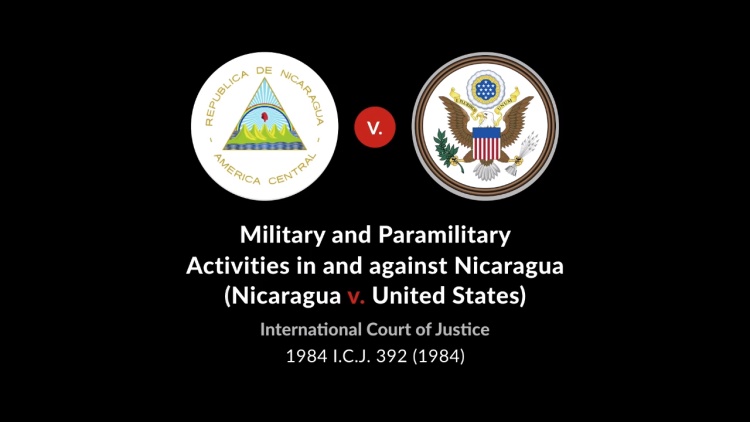Military and Paramilitary Activities in and Against Nicaragua (Nicaragua v. United States)
International Court of Justice
1984 I.C.J. 392
- Written by Megan Petersen, JD
Facts
On April 9, 1984, Nicaragua (plaintiff) filed suit against the United States (defendant) in the International Court of Justice (ICJ). Nicaragua alleged the United States was responsible for military and paramilitary activities in and against Nicaragua. As a basis for the ICJ’s jurisdiction over the claim, Nicaragua sought to invoke declarations made by both States under Article 36 of the Statute of the Court. Article 36 states that “declarations made under the Statute of the Permanent Court of International Justice and which are still in force shall be deemed” to be acceptances of the ICJ’s compulsory jurisdiction. Three days prior to Nicaragua’s claim, the United States deposited a declaration with the United Nations (UN) Secretary General saying that its previous declaration, made under the Statute of the Permanent Court of International Justice, did not apply to disputes between the United States and Central American States. Rather, the United States said that it preferred regional settlement of disputes. However, when Nicaragua brought its case against the United States on April 9, it sought to establish that it was a “State accepting the same obligation” as the United States under Article 36 of the Statute of the Court. In so arguing, Nicaragua sought to prove that its acceptance of the same obligation to be bound by ICJ jurisdiction meant that the United States was also still bound by its previous Article 36 acceptance, and that ICJ jurisdiction was appropriate over the present dispute. Nicaragua relied on statements it made in 1929, under the Permanent Court of International Justice, and later under the Statute of the International Court of Justice which accepted ICJ jurisdiction over its international disputes. However, Nicaragua’s official ratification of its 1929 statement was never actually received by the League of Nations. Based on this missing ratification, the United States argued that Nicaragua never became a party to the Statute of the Permanent Court and that its 1929 declaration accepting ICJ jurisdiction was not “still in force” when Article 36 of the Statute of the present ICJ was adopted.
Rule of Law
Issue
Holding and Reasoning ()
What to do next…
Here's why 899,000 law students have relied on our case briefs:
- Written by law professors and practitioners, not other law students. 47,000 briefs, keyed to 994 casebooks. Top-notch customer support.
- The right amount of information, includes the facts, issues, rule of law, holding and reasoning, and any concurrences and dissents.
- Access in your classes, works on your mobile and tablet. Massive library of related video lessons and high quality multiple-choice questions.
- Easy to use, uniform format for every case brief. Written in plain English, not in legalese. Our briefs summarize and simplify; they don’t just repeat the court’s language.







